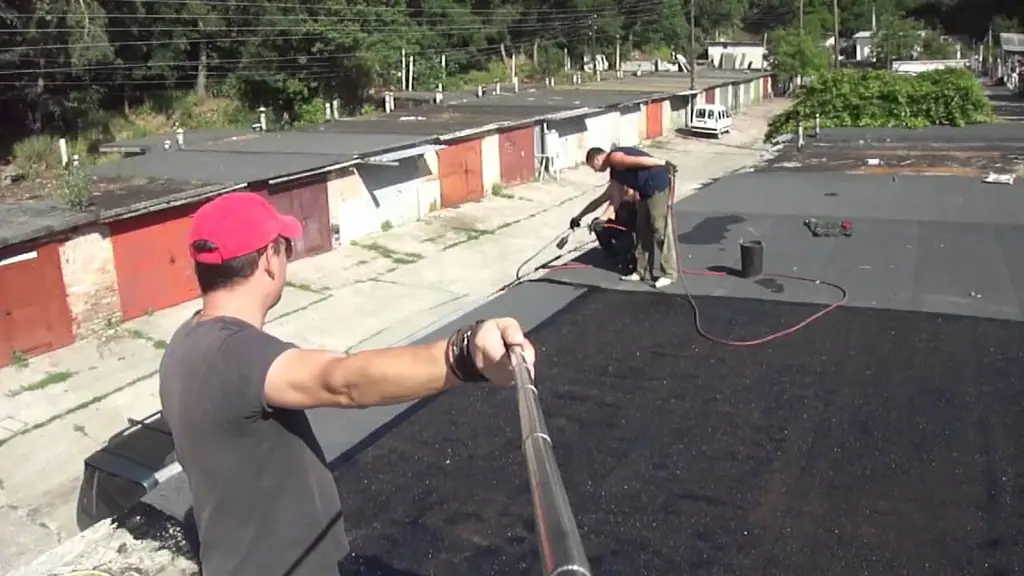
Table of contents:
- Author Bailey Albertson albertson@usefultipsdiy.com.
- Public 2023-12-17 12:53.
- Last modified 2025-06-01 07:32.
Moisture Armor: Garage Roof Waterproofing

Dampness and coolness are unacceptable when it comes to a garage and you don't want to contemplate the unpleasant picture of car damage by corrosion. Only those who have enlisted the help of waterproofing material will be able to cancel the meeting with the rusting of personal vehicles. It is especially needed as a shield against atmospheric precipitation that tends to get into the room through the roof.
Content
- 1 Garage roof waterproofing material
-
2 Waterproofing the roof of the garage
- 2.1 Toolbox
-
2.2 Guidelines for laying waterproofing material for different types of roofing
- 2.2.1 Iron garage
- 2.2.2 Concrete roof
- 2.2.3 Underground garage
- 2.2.4 Garage roof with battens
- 2.3 Video: how to cover the roof of the garage yourself
-
3 Replacing waterproofing on the roof of the garage
3.1 Video: urgent roof repair
Garage Roof Waterproofing Material
In order for the roof to gain protection from precipitation and condensation, one of the following materials is included in its structure:
-
waterproofing film (made of polyethylene or polypropylene), laid under the finishing roofing and fixed to the lathing with metal brackets;

Polyethylene film for roofing Polyethylene film is suitable for waterproofing most structures
-
rolled waterproof fabric (roofing material, waterproofing material, vinyl plastic, isoplast or brizol), which is spread with overlaps, adheres to the surface with bitumen and adheres to the base by fusion;

Hydroizol Hydroizol is a good representative of rolled waterproofing material
-
protective dyes, which are bitumen, paint, varnish or emulsion made of polymers and applied to the roof with a layer of 3-6 mm;

Bitumen Bitumen hardens on the roof and forms a thick and reliable film
-
bitumen mastic, polymer or polymer-bitumen, applied to the surface by pouring in a hot or cold state;

Bituminous mastic Bituminous mastic can be spread over the base of the roof both cold and hot
-
a penetrating waterproofing compound, that is, liquid glass, synthetic resin or another agent that perfectly repels moisture from the concrete surface, since it fills the structure of the porous material and is applied with a spray gun in 2-3 layers;

Penetrating roof waterproofing Penetrating waterproofing is sprayed onto the base of the roof like paint
- matter in the form of metal sheets welded together (made of aluminum and lead), fixed on the base with self-tapping screws.
For waterproofing garage roofs, which are most often built from concrete or metal, liquid products are most in demand.

Liquid moisture protection products allow you to plug all voids in the roof
The modern version of the aqueous composition for the treatment of garage roofs made of metal, concrete or wood is liquid rubber. The construction product is famous for certain advantages:
- creation of a seamless coating;
- immunity to ultraviolet light;
- independence from temperature changes;
- harmless to the environment;
- high elasticity;
- minimum consumption;
- long service life.

Liquid rubber goes well with concrete and metal
The roof of the garage, where the crate is provided, is preferable to cover it with a film or sheet material. The waterproofing sheet is attached directly under the final roofing.
Regardless of the type of construction for a garage roof, waterproofing is ideal - a roll material based on fiberglass, treated with a product with polymers and bitumen

Hydroisol is in demand, as it is superior in quality to ordinary roofing material
The advantages of hydroisol include:
- strength, which is higher than that of roofing material;
- good elasticity;
- ability to muffle rain noise;
- resistance to negative manifestations of the environment;
- long-term operation.
A worthy competitor to waterproofing in terms of waterproofing the garage roof is a polymer membrane up to 3 mm thick. The strip of this material is up to 60 m long and up to 150 cm wide.

The polymer membrane is renowned for its strength and ability to resist moisture
The advantages of a polymer membrane are recognized:
- service life up to half a century;
- resistance to ultraviolet rays;
- painless contact with moisture;
- independence from temperature drops;
- strength against mechanical stress.
The strips of the polymer membrane are spread on the roof and welded together.
Garage roof waterproofing
How and how to secure a garage roof from precipitation depends on the material from which it was made.
Set of tools
In the process of waterproofing a garage roof, you may need tools such as:
- spatulas (narrow and wide);
- brushes;
- roller;
- sharp knife (for cutting canvases);
-
roofing gas burner.

Roof burner A roof burner is used as a tool for installing soft roofing, which is usually found in garages.
Installation guide for different types of roof waterproofing
To protect the roof of the garage from moisture, usually proceed as follows:
-
the iron roof is treated with liquid rubber or bitumen mastic;

Iron garage roof The roof of an iron garage is often treated with mastic
- the concrete base is insulated and covered with roll material, which is glued to bitumen or mastic;
-
the overlap of the underground garage is protected from water with a thick coating or liquid penetrating composition;

Underground garage An underground garage requires reliable roof waterproofing
- the roof with slate is insulated from moisture by means of a roll material, for example, roofing material.
Iron garage
When the roof of the garage is made of iron, the following tasks are performed for waterproofing purposes:
- Work is scheduled for the day when warm, but not sultry weather sets in. This means that the outdoor thermometer must read at least 5 ° C.
-
The surface is brought to a perfectly clean condition. The damaged areas of the iron roof, restored with sandpaper, are first treated with liquid rubber, the layer of which is spread so that it is flush with the metal surface.

Iron roof restoration process Flaws are eliminated with liquid rubber
-
Cold liquid rubber is applied in portions to an iron roof. The composition is spread over the metal base with a wide brush, forming a neat layer 3-4 mm thick. The created layer of liquid rubber is carried out with a wide spatula, achieving perfect evenness. If desired, instead of liquid rubber, roofing material (or waterproofing) canvases are used. They are laid out with overlaps of 10 cm. The overlap zones are coated with mastic and glued with a gas burner.

Installation process of waterproofing sheet The canvases are fixed on an iron base, armed with a gas burner
- The first layer of liquid rubber is expected to harden within 15 minutes. When the composition reliably adheres to the base, proceed to applying a second layer of liquid mass. If necessary, it is supplemented with a third layer, which, like the previous one, is smeared, following the elevation differences.
Concrete roof
Waterproofing of a concrete garage roof is usually combined with insulation, therefore, they act as follows:
-
The concrete surface cleared of debris is treated with a frost-resistant deep penetration primer. As soon as the composition dries, pieces of foam are laid out on the base of the roof, on the back side they are greased with glue for insulation. Dowels ("umbrellas") are used to strengthen the fixation of the heat-insulating material. The gaps between the foam plates are filled with polyurethane foam.

The process of treating a concrete roof with a primer Only after priming is the concrete ready for waterproofing
- Rolls of roofing material are rolled out on the roof. As soon as the material "gets used" to the new state, it is rolled back for a while.
- A layer of insulation is covered with a layer of cement-sand mixture, creating a screed 4 cm thick and with a slope of 4 °. The hardened concrete layer is treated with a primer or mastic with polymers and bitumen in the composition.
-
The seamy side of the roofing material is gradually adhered to the concrete base.

The process of laying roofing material on a concrete roof Roofing material is rolled out on the roof, having previously processed it with mastic
- A strip of roofing material stuck to the base is carried out with a hand roller. The next piece of material is fixed on the surface by placing its left edge on 10-15 cm of the previous piece of the roll.
Underground garage
The roof of the underground garage is waterproofed by performing the following steps:
-
The ceiling slab is cleaned and treated with a roller with a primer or ordinary bitumen, which is specially mixed with gasoline to obtain a liquid composition.

The process of preparing an underground roof for waterproofing The concrete roof of the underground garage is primed
- A separate section of the roof is covered with bituminous mastic. As a result of this, a strip should be obtained slightly wider than a roll of material, for example, waterproofing or bitumen-polymer membrane. A rolled waterproofing sheet is glued to the newly applied mastic, which is necessarily pressed to the base with a heavy roller. According to this scheme, the entire roof is gradually covered.
-
The fixed waterproofing is treated with an antifungal composition, dried and covered with a primer. Insulation is glued on top of the waterproofing material. It, in turn, is covered with geotextiles, a profiled drainage membrane and again with geotextiles. The roofing "pie" is covered with fertile soil.

Underground garage roof structure When installing an underground roof, one waterproofing membrane is indispensable
Garage roof with lathing
When a crate is installed on the garage roof, they take a polymer membrane and carry out step-by-step work:
- One by one, strips of membrane are laid out on the crate. At the same time, overlaps of 10 cm are made. Pieces of fabric are sewn together by welding.
-
Each canvas using a construction stapler is fixed on a wooden crate with iron staples. Under no circumstances should the membrane be overtightened; it must lie loosely on the crate.

Garage roof with lathing Garage roof with lathing can be covered with roofing felt or membrane
-
A counter-lattice 2.5 cm thick is fixed on the waterproofing material, which will create a mandatory ventilation gap between the membrane and the finishing coating of the garage roof.

Counter lattice device Counter grill provides ventilation gap
Video: how to cover the roof of the garage yourself
Replacing waterproofing on the roof of the garage
If the soft waterproofing material on the garage roof has deteriorated only partially, then the repair work is carried out as follows:
-
Debris and dirt are removed from the waterproofing sheet. Leaky areas are cleaned with great care.

The process of finding "problem" roof spots The damaged areas of the roof are cleaned and cut with a knife
- Places where bulges and cracks are found are cut crosswise with a sharp knife. The resulting "pockets" are folded back and pressed against the roof with a heavy object. The hole opened in the roof is freed from debris and dried with an air jet of a construction hair dryer.
- From a new roll of roofing material, cut out pieces the size of "envelopes", opened in a layer of waterproofing. The voids in the material are abundantly coated with bitumen mastic or molten resin. The cut patches are inserted inside the opened "letters" and pressed down with force.
-
The inserted piece of material is lubricated with resin or liquid bitumen. The edges of the "envelope" are returned to their original position by gluing them with the previously installed patch.

The process of partial repair of a soft garage roof Bitumen and several patches are used to repair a soft garage roof.
- Patches are again placed on top of the sealed envelopes. True, this time pieces of roofing material are taken as them, which can close not only the repaired area, but also 15-20 cm of the area around it. The last fragments must be treated with mastic.
When the roof of the garage needs a thorough, overhaul, other measures are taken:
- Cornice and front strips, as well as gutters, are removed from the roof.
-
Armed with a chasing cutter, strips are cut in a worn waterproofing layer no more than 3 cm thick, which will significantly speed up the dismantling of the old coating. A thick waterproofer is disposed of with a roofing ax. With this tool, the waterproofing sheet is divided into "squares" and ripped off the surface.

The process of dismantling the old garage roof covering The old garage roof covering is removed with a special tool
-
The base, devoid of a waterproof layer, is cleaned of crumbs and fasteners. Found cracks or flaws are covered with a cement-sand mixture or sealant.

Garage Roof Base Repair Process Defects in the base of the garage roof are eliminated with liquid concrete or sealant
- A new waterproofing carpet is laid on the repaired base. Work begins from the bottom of the roof slope. Roofing material is spread over bitumen mastic, and bikrost is fused with a gas burner. The second layer of waterproofing material is mounted after 12 hours, while the seams must be covered.
Video: urgent roof repair
Whatever the roof of the garage is - concrete, iron or underground, it is necessary to protect it from moisture with full knowledge of the matter. The type of waterproofing material, the degree of its compatibility with the base of the roof and the laying technology are subject to a thorough analysis.
Recommended:
The Roof For The Hangar, How To Do It Right, Including With Your Own Hands, As Well As The Features Of Its Design And Installation
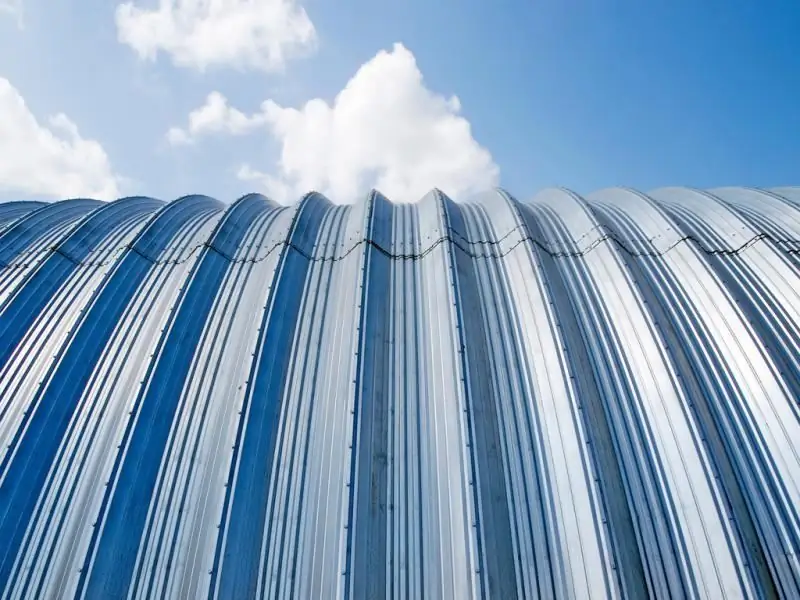
How the hangar roof shape depends on its function. The better to insulate the hangar roof. DIY hangar roof assembly instructions
How To Make A Roof For A Bathhouse, Including With Your Own Hands, As Well As The Features Of Its Design And Installation
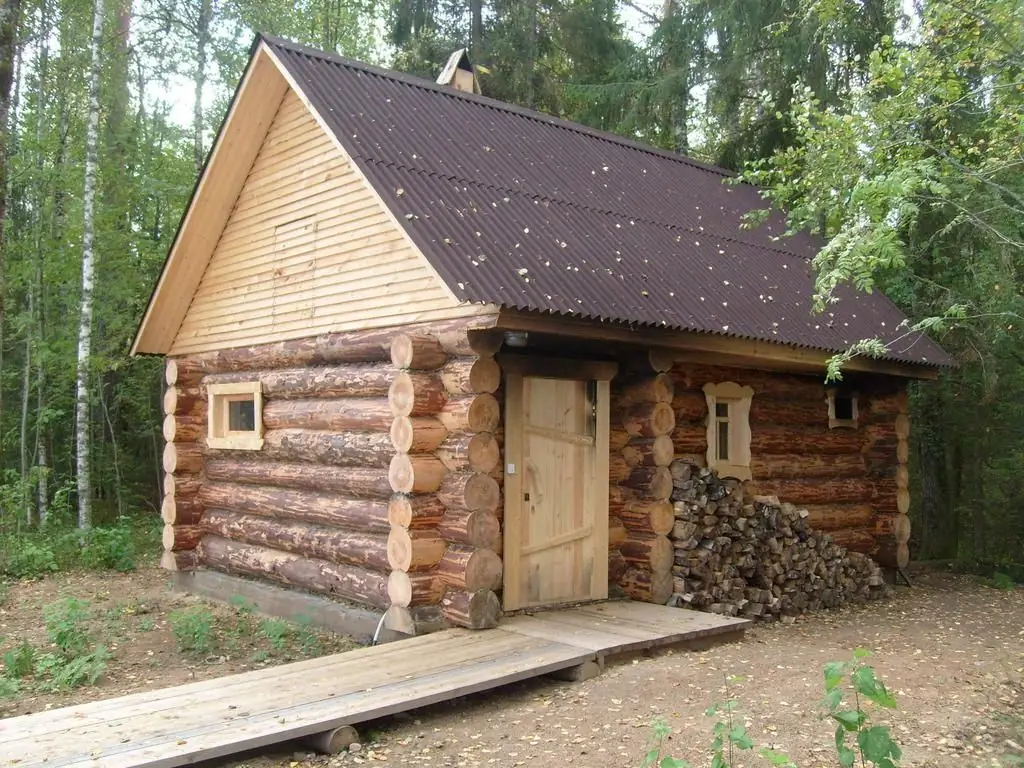
Types of roofs in baths and features of their design. The choice of materials for this design. Roof construction for a bath. Bath roofing repair
Shed Roof For A Garage, How To Do It Right, Including With Your Own Hands, As Well As The Features Of Its Device And Installation
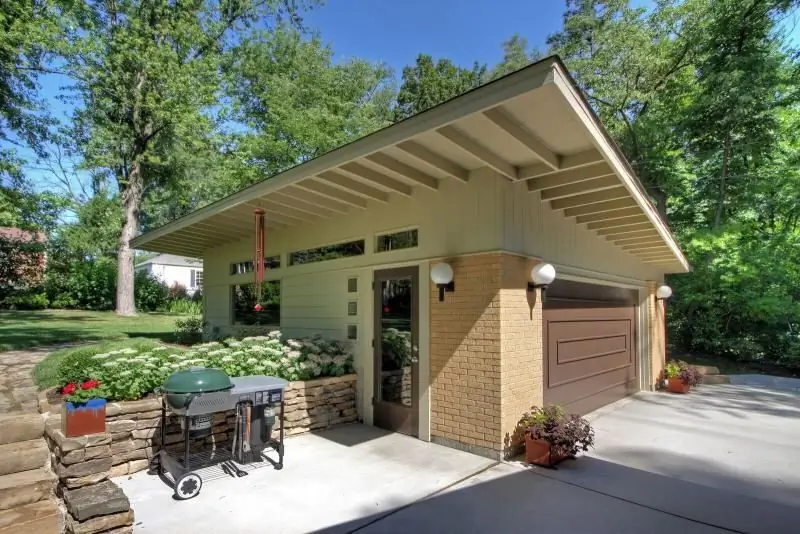
Existing types of pitched roofs. Features of creating and maintaining such a structure in their own hands. What tools and materials you need to have
How To Make A Roof For A Summer Residence, Including With Your Own Hands, As Well As The Features Of Its Design And Installation
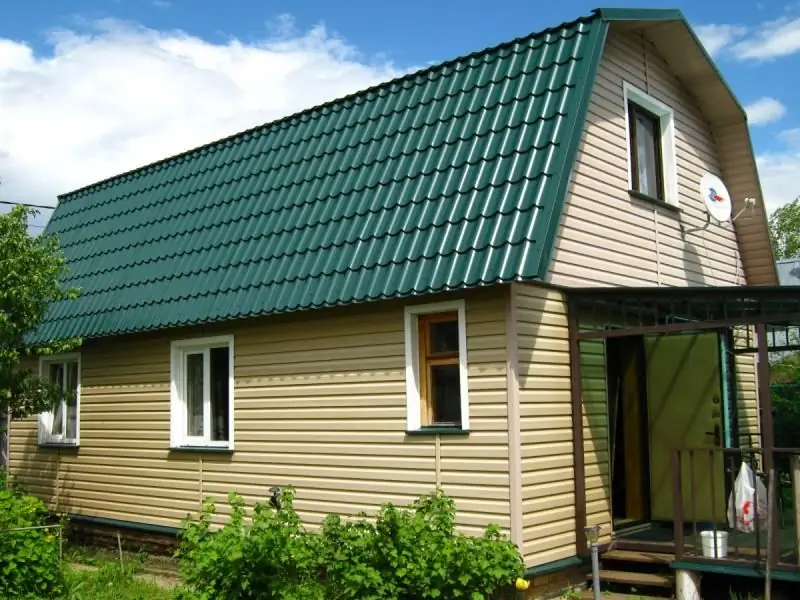
Types of roofs for summer cottages. Calculation and selection of materials. DIY installation and insulation, Dacha roof repair with replacement of materials
Installation Of Roof Windows, Including With Your Own Hands, As Well As Installation Features In An Already Finished Roof
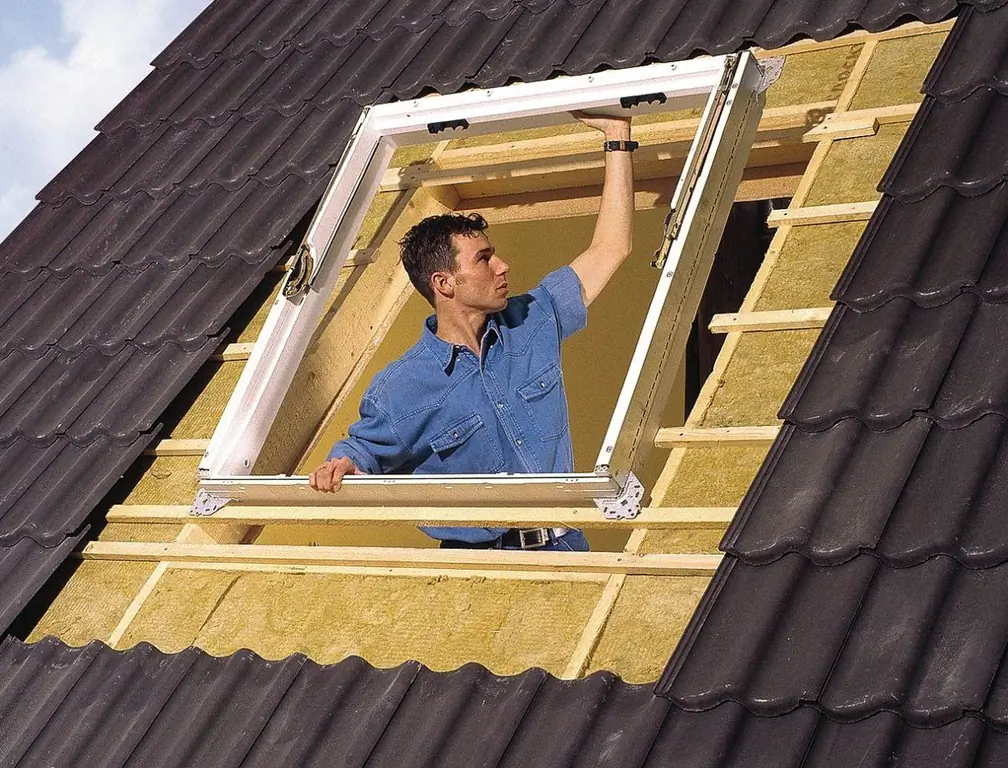
Step by step instructions for installing a roof window. Features of technology and nuances of installation in various types of roofing
